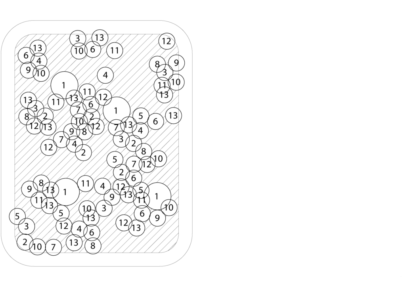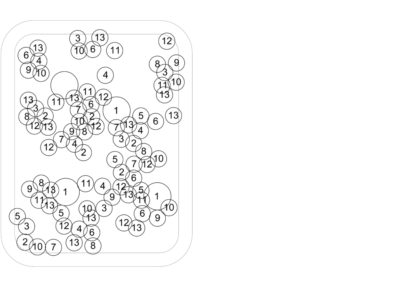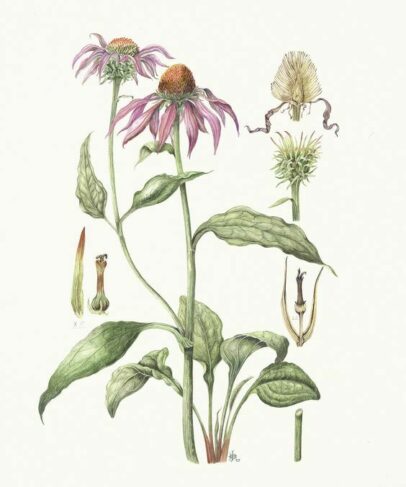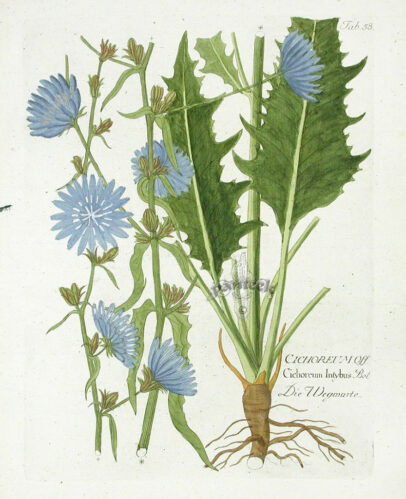Two small gardens are on two islands of almost identical size, floating on the river. They remind us of how we have created controlled territories for centuries and, at the same time, how we have lost the illusion of control in the context of ecological and economic catastrophe.
Although they are isolated, gardens – places of human-made care and creativity – are also integral parts of the surrounding environment: roots extend freely through garden boundaries to mesh with the soil, and environmental factors are not modified by the boundary of this allocated area. Gardens disrupt the normality of everyday places and they can also be perceived as alternative realities offering new perceptions and perspectives.
The Healing Garden consists of herbs and vegetables from local organic gardening that are not only beneficial to humans but also to the growth of plant symbiotic populations. In the Future Garden, there are plants for the future climate; plants that cleanse the soil of toxic substances and plants that have appeared in the area and adapted to global weather changes. Its soil and vegetation are a combination of wild urban and cultivated vegetation that are temporarily replanted from the campus field of the University of Kassel where the Department of Landscaping, Landscape Management, and Vegetation Development conducts research.
Each garden needs special attention and care, but in a different way because the plants are dissimilar and their rules of coexistence are not the same. They are sensitive and adaptive ecosystems with their own living conditions, requiring maintenance based on cooperation between the carer and the cared for. It is adventurous gardening where we can experiment with a small-scale model of our living environmental system not only for the present but also for the foreseeable future. What will happen to the gardens during the 100 days of documenta fifteen depends on those dedicated applicants who are renting them for free in exchange for care.
Original species from the campus of the University of Kassel

Climate changes tolerant species
1. Rosa glauca
Petroleum degradation plants and metal excluders and accumulators
13. Festuca gautieri
Original species from the campus of the University of Kassel
Foeniculum vulgare atropurpureum
Added species
Healing Garden

Two small gardens are on two islands of almost identical size, floating on the river. They remind us of how we have created controlled territories for centuries and, at the same time, how we have lost the illusion of control in the context of ecological and economic catastrophe.
Although they are isolated, gardens – places of human-made care and creativity – are also integral parts of the surrounding environment: roots extend freely through garden boundaries to mesh with the soil, and environmental factors are not modified by the boundary of this allocated area. Gardens disrupt the normality of everyday places and they can also be perceived as alternative realities offering new perceptions and perspectives.
The Healing Garden consists of herbs and vegetables from local organic gardening that are not only beneficial to humans but also to the growth of plant symbiotic populations. In the Future Garden, there are plants for the future climate; plants that cleanse the soil of toxic substances and plants that have appeared in the area and adapted to global weather changes. Its soil and vegetation are a combination of wild urban and cultivated vegetation that are temporarily replanted from the campus field of the University of Kassel where the Department of Landscaping, Landscape Management, and Vegetation Development conducts research.
Each garden needs special attention and care, but in a different way because the plants are dissimilar and their rules of coexistence are not the same. They are sensitive and adaptive ecosystems with their own living conditions, requiring maintenance based on cooperation between the carer and the cared for. It is adventurous gardening where we can experiment with a small-scale model of our living environmental system not only for the present but also for the foreseeable future. What will happen to the gardens during the 100 days of documenta fifteen depends on those dedicated applicants who are renting them for free in exchange for care.
Healing Garden
1. Beta vulgaris spp. vulgaris
6. Fragaria vesca var. Semperflorens
10. Ocimum x africanum ‘African blue’
Floating Gardens @ Documenta fifteen






